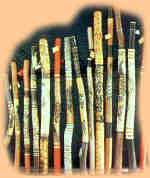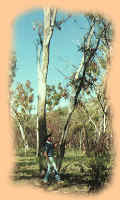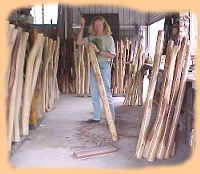 The
Didjshop - also known as didjshop.com - is the online retail outlet of The Didgeridoo Specialist, a registered business since
1993. The Didjshop's virtual doors opened in January 2000. The
Didjshop - also known as didjshop.com - is the online retail outlet of The Didgeridoo Specialist, a registered business since
1993. The Didjshop's virtual doors opened in January 2000.
The Didgeridoo Specialist has been wholesaling and exporting genuine Aboriginal made didgeridus and other Aboriginal artifact
since October 1992.
Our business has been constantly growing over those years without any advertising. We believe that providing a high quality product
with a good customer service is the best advertising there is.
Contact details for The Didjshop are here.
Facilities
We operate out of an over 200 m² shed on our own rural property. We have a large workshop, a big storeroom and commercial packing
facilities. At any given time we keep at least five hundred didjeridus and hundreds of other items in stock and handle thousands of didgeridoos
each year.
Environmental Awareness
 Our
electricity requirements are 100% supplied by solar power. Although mains electricity goes past our property, we have opted not to use it but to
produce our own with solar energy. We firmly believe that humanity's present overuse of fossil fuels is the biggest threat to our survival on this
planet. So we opted not to be part of the problem but rather to be part of the solution. Our
electricity requirements are 100% supplied by solar power. Although mains electricity goes past our property, we have opted not to use it but to
produce our own with solar energy. We firmly believe that humanity's present overuse of fossil fuels is the biggest threat to our survival on this
planet. So we opted not to be part of the problem but rather to be part of the solution.
Ethics
Didjshop.com is owned and operated by non-indigenous people.
We buy our Aboriginal arts and crafts only from Aboriginal people. There are many non-Aboriginal people making and painting didgeridoos,
clap sticks, boomerangs etc - and even selling them as Aboriginal art. In fact the vast majority of didjeridus on the market are harvested and
painted by non Aboriginal people. There's no law against it, but we consider it highly unethical.
The Didjshop supports the production of traditional artefacts by Aboriginal people - and the harvesting of the natural
resource used to make didjeridus by the traditional owners of the land. Too much of this continent has already been destroyed by greedy land exploiters
only interested in a quick buck.
Our experience has been that many Aboriginal didj-makers are not business-oriented in the conventional western sense. They live
by a different ethic.
Our Aboriginal suppliers might create and sell some didjeridus to get some money for a particular purpose, then not worry about
making didjes for a few months. Then one day they may turn up to offload a hundred didjes in one go, because a large bill has to be paid. This
makes it difficult for us to maintain a constant supply of specific types of didj. We stay in business by having dozens of different suppliers
and lots of spare stock.
 Our
Aboriginal craftspeople tend to live for the moment - not for the future or to accumulate lots of money, which to them seems as foolish as killing
fifty kangaroos today to have food next month. They live to fulfil present needs, not future desires. Our
Aboriginal craftspeople tend to live for the moment - not for the future or to accumulate lots of money, which to them seems as foolish as killing
fifty kangaroos today to have food next month. They live to fulfil present needs, not future desires.
This doesn't fit well with non-Aboriginal Australia's way of doing business, and most shops and didgeridoo merchants find it easier to
get supplies from non-Aboriginal didgeridoo makers, who are willing to commit to supplying what customers want, when they want it.
Often highly motivated to make lots of money, these cutters have economies of scale rather than quality and a lack of environmental
conscience which help keep their prices low. They may cut many hundreds of trees within a small area to maximize immediate cash returns - even
though this way of harvesting is unsustainable in the long term. There's a real danger of Aborigines being progressively squeezed out of the didjeridu
industry by ruthless non-Aboriginal people willing to sacrifice the environment and long-term resource for quick profits.
We understand that our suppliers can not compete with unethical non-Aboriginal cutters and we pay them accordingly.
Workmanship
 We love didjeridus
and when we work on them we do so as if each individual didgeridoo is our own. Each Didgeridoo gets handled at least 25 times in different processes
to get the best possible sound out of it and to preserve and protect it as well as possible. No one else in the didgeridoo industry bothers about
spending so much time or to use such expensive materials. Often the workmanship of our cheapest didgeridoos is better than workmanship on the best
didjes of our competition. We love didjeridus
and when we work on them we do so as if each individual didgeridoo is our own. Each Didgeridoo gets handled at least 25 times in different processes
to get the best possible sound out of it and to preserve and protect it as well as possible. No one else in the didgeridoo industry bothers about
spending so much time or to use such expensive materials. Often the workmanship of our cheapest didgeridoos is better than workmanship on the best
didjes of our competition.
We understand some people just want a cheap didj - but we believe they'd be more cautious about making price the only consideration
if they realised how many cheap didjeridus crack later on. We also trust that a high proportion of didj players and didjeridu fans worldwide care
that Aboriginal people get remuneration for producing their traditional artefacts, and would be appalled if they knew that dozens of trees are often
needlessly felled for one didge, because a non-Aboriginal cutter doesn't care for trees and the fastest way to tell whether a tree is hollow is to chainsaw
it and look inside!
Although our mark-up is probably a lot lower than the margins of unscrupulous didj makers and merchants, we can't compete with
them on price.
Fortunately, we believe a growing number of people are prepared to pay a little extra for quality and ethics.
If you could have a cheap toy guitar for $100 or a Fender for $150 - which one would you chose?
More info about the Didjshop Team |
